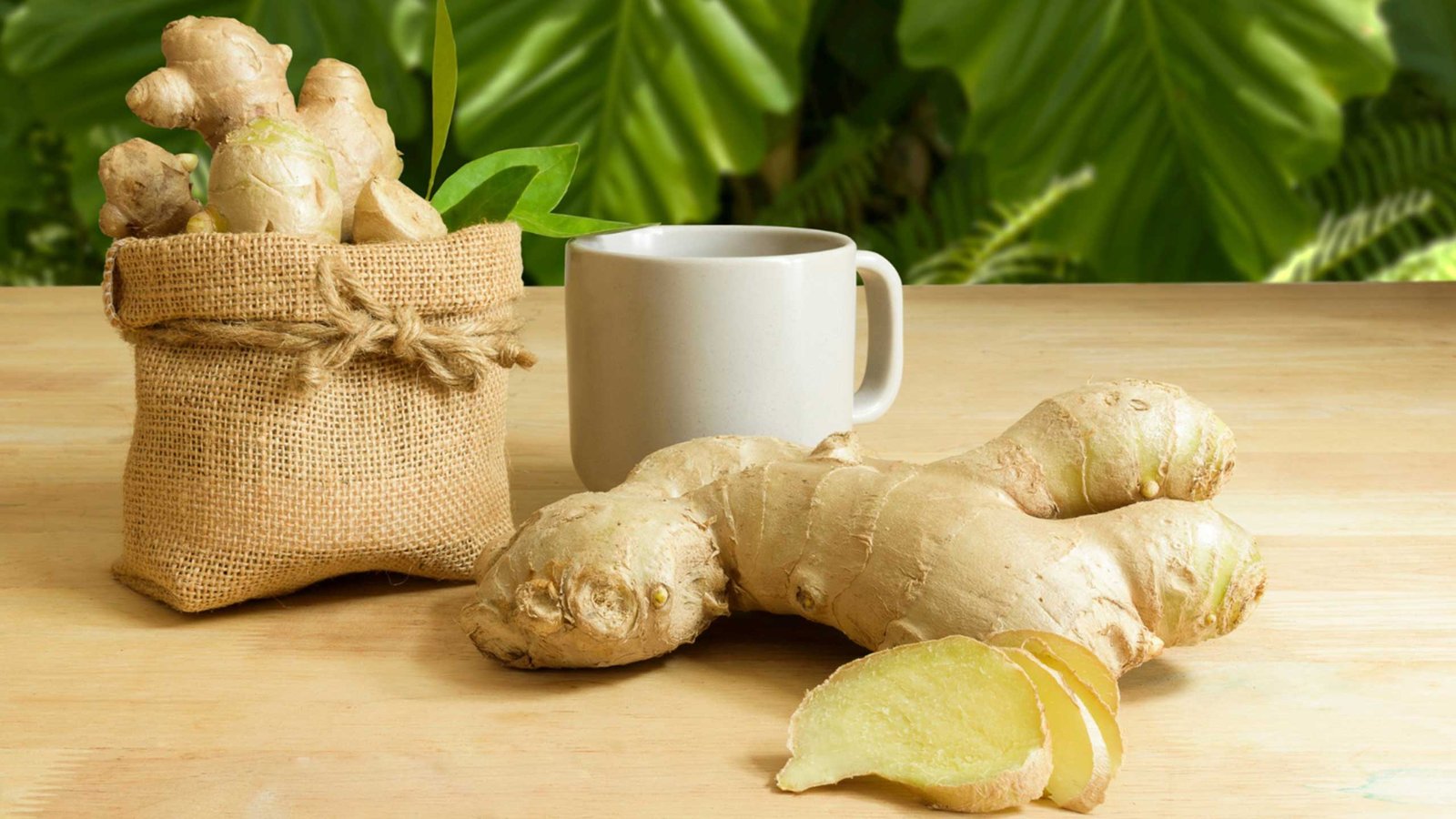Health Benefits of Ginger : Ginger is not just a spice that adds flavor to your meals; it’s a powerhouse of health benefits. From soothing an upset stomach to reducing inflammation, ginger has been used for centuries in traditional medicine. In this article, we will explore the numerous benefits, uses, and potential side effects of ginger, along with some interesting facts about this versatile root.
Table of Contents
What is Ginger?
Ginger, scientifically known as Zingiber officinale, is a flowering plant that originated in Southeast Asia. It belongs to the Zingiberaceae family, which also includes turmeric and cardamom. The rhizome, or underground stem, of the ginger plant is the part commonly used as a spice and for its medicinal properties.
Nutritional Content of Ginger
Ginger is low in calories but rich in nutrients. It contains vitamins, minerals, and bioactive compounds that contribute to its health benefits. Some of the key nutrients found in ginger include:
- Vitamin C: An antioxidant that helps boost the immune system.
- Vitamin B6: Important for brain health and metabolism.
- Potassium: Essential for heart health and regulating blood pressure.
- Magnesium: Helps maintain nerve and muscle function.
- Iron: Important for red blood cell production.
Health Benefits of Ginger

Bell Pepper Health Benefits: Adding Color and Nutrition to Your Plate
Digestive Health
Ginger is widely known for its ability to aid digestion. It helps reduce bloating, gas, and indigestion by speeding up the emptying of the stomach. Ginger also contains compounds that can help relieve nausea and vomiting, making it particularly useful for pregnant women experiencing morning sickness.
Anti-Inflammatory Properties
Ginger contains bioactive compounds with powerful anti-inflammatory properties. These compounds can help reduce inflammation in the body, which is believed to play a role in the development of chronic diseases such as heart disease, arthritis, and cancer.
Pain Relief
Ginger has been used for centuries as a natural remedy for pain relief. It can help reduce muscle pain, menstrual pain, and osteoarthritis pain due to its anti-inflammatory properties.
Immune Boosting
The high antioxidant content in ginger helps strengthen the immune system, making it more effective at fighting off infections and illnesses.
Weight Management
Ginger may help with weight management by increasing metabolism and reducing feelings of hunger, leading to fewer calories consumed.
Uses of Ginger
Ginger can be used in various forms, including fresh, dried, powdered, or as an oil or juice. It is commonly used in cooking to add flavor to dishes such as curries, stir-fries, and soups. Ginger can also be brewed into tea or used as a natural remedy in traditional medicine.
How to Incorporate Ginger in Diet
There are many ways to incorporate ginger into your diet. You can:
- Add grated ginger to smoothies or juices.
- Use ginger in marinades or salad dressings.
- Brew ginger tea by steeping fresh ginger slices in hot water.
- Use ginger in baking to add flavor to cakes, cookies, and bread.
Ginger Recipes
Ginger Tea
Ingredients:
- 1-inch piece of fresh ginger, peeled and sliced
- 1 cup of water
- Honey (optional)
Instructions:
- Bring water to a boil in a small saucepan.
- Add ginger slices and reduce heat to simmer for 5-10 minutes.
- Remove from heat and strain.
- Add honey to taste, if desired.
Ginger Stir-Fry
Ingredients:
- 1 tablespoon of vegetable oil
- 1 garlic clove, minced
- 1 tablespoon of fresh ginger, grated
- 2 cups of mixed vegetables (e.g., bell peppers, broccoli, carrots)
- 1 tablespoon of soy sauce
- Cooked rice or noodles, to serve
Instructions:
- Heat oil in a large skillet over medium-high heat.
- Add garlic and ginger, and sauté for 1 minute.
- Add mixed vegetables and soy sauce, and stir-fry until vegetables are tender.
- Serve over cooked rice or noodles.
Health benefits of ginger tea
Ginger tea offers a myriad of health benefits. It aids digestion, reduces nausea, and alleviates inflammation. Its antioxidants boost immunity and fight respiratory infections. Gingerol, its active compound, may lower the risk of heart disease. Additionally, ginger tea can relieve menstrual discomfort and improve brain function.

health benefits of ginger oil
Ginger oil boasts numerous health benefits. It can alleviate nausea and aid digestion. Its anti-inflammatory properties help reduce muscle and joint pain. Ginger oil may also boost circulation and promote heart health. Additionally, it can improve respiratory conditions and act as a natural remedy for menstrual discomfort.
health benefits of ginger juice
Ginger juice offers several health benefits. It aids digestion, reduces nausea, and can help alleviate inflammation and muscle pain. Ginger juice is also rich in antioxidants, which can boost immunity and protect against chronic diseases. Additionally, it may improve blood sugar control and promote heart health.
health benefits of ginger for men
Ginger offers several health benefits specifically for men. It can help improve reproductive health by increasing testosterone levels and sperm count. Ginger’s anti-inflammatory properties may also reduce the risk of prostate cancer and improve overall prostate health. Additionally, ginger can aid digestion, boost immunity, and improve cardiovascular health, benefiting men’s overall well-being.
health benefits of ginger for women
Ginger provides various health benefits for women. It can help alleviate menstrual cramps and symptoms of PMS, thanks to its anti-inflammatory properties. Ginger may also help with morning sickness during pregnancy and has been used traditionally to induce menstruation. Additionally, ginger’s antioxidant properties can support overall health and well-being in women.
Ginger benefits sexually
Ginger may offer some benefits for sexual health. It can potentially improve blood circulation, which is important for sexual function. Additionally, ginger’s anti-inflammatory properties may help reduce inflammation in the body, which could positively impact sexual health. However, more research is needed to fully understand ginger’s effects on sexual health.
benefits of eating ginger
Eating ginger offers numerous health benefits. It aids digestion, reduces nausea, and can help alleviate inflammation and muscle pain. Ginger is also rich in antioxidants, which can boost immunity and protect against chronic diseases. Additionally, it may improve blood sugar control, promote heart health, and support overall well-being.
Precautions and Side Effects
While ginger is generally considered safe for most people, it may cause some side effects in certain individuals. These may include:
- Heartburn: Some people may experience heartburn or stomach upset when consuming ginger.
- Allergic Reactions: Allergic reactions to ginger are rare but can occur in some individuals.
- Interactions with Medications: Ginger may interact with certain medications, so it’s important to consult with a healthcare professional before using ginger supplements.
Can ginger help with arthritis pain?
Yes, ginger has anti-inflammatory properties that can help reduce arthritis pain and inflammation.
How much ginger should I consume daily?
The recommended daily intake of ginger varies but is generally around 1-2 grams per day for health benefits.
Can ginger help with migraines?
Some studies suggest that ginger may help reduce the severity and duration of migraines, but more research is needed.
Can ginger interact with medications?
Yes, ginger may interact with certain medications, including blood thinners and diabetes medications. It’s best to consult with a healthcare professional before using ginger supplements.
Conclusion
In conclusion, ginger is a versatile and beneficial spice that offers a wide range of health benefits. From aiding digestion to reducing inflammation and relieving pain, ginger has been used for centuries in traditional medicine. Incorporating ginger into your diet can be easy and delicious, whether you add it to your cooking or brew it into a soothing tea. However, it’s important to use ginger responsibly and consult with a healthcare professional if you have any concerns or are taking medications.


2 thoughts on “Discover the Health Benefits of Ginger: Uses, Side Effects”